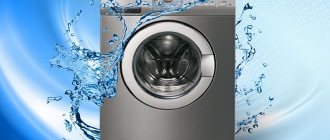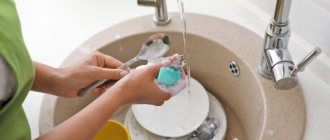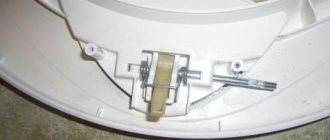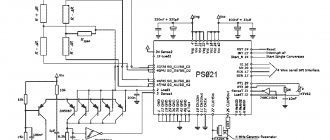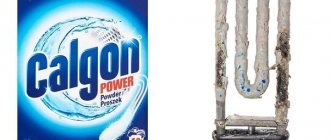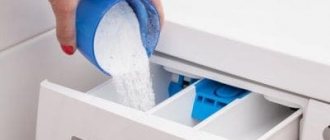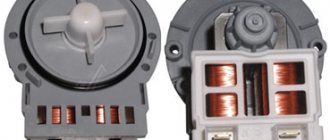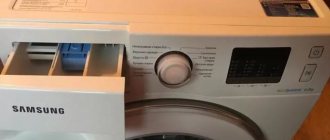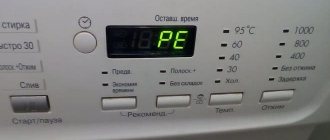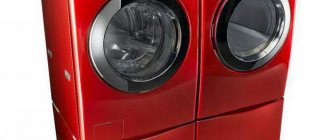Each model of household appliance consumes a different amount of energy - this primarily depends on its purpose and rated power. Each user can find out what the power consumption of the washing machine is by looking at the sticker located on the back wall of the product - this parameter is indicated in kW/h. It determines which economic class the device belongs to.
Classification of washing units
All household appliances are divided according to their efficiency in consuming electrical energy into certain classes, designated by Latin letters from A to G. The “+” sign is also added to them: for example, the most economical product is considered to be the one with the “A++” sign.
Such signs are placed on special stickers located on the body of the household appliance. On the manufacturer's website you can find a complete description of your model indicating the efficiency class.
To calculate the number of kilowatts per kg, special laboratory tests are carried out, after which household appliances are assigned a certain class:
- The most economical units are considered to be “A++” class units. This is the minimum electrical energy consumption: 0.15 kW/h per 1 kg.
- Next comes class “A+” - less than 0.17 kW/h x 1 kg.
- Class “A” is average, its energy consumption is in the range of 0.17-0.19 kW/h for washing 1 kg of laundry.
- A product with the letter “B” will need 0.19–0.23 kW/h for a similar operation.
- Class “C” consumes 0.23-0.27 kW per hour when washing one kg of laundry.
- A washing unit with the letter “D” will consume 0.27–0.31 kW/h under the same washing conditions.
Further listing does not make sense, because modern household appliances no longer use them for washing - these classes will require much more electrical energy consumption. During laboratory studies, washing occurs at 600C with a maximum load of cotton laundry. In real life, everything happens a little differently, so this parameter may be completely different for your assistant.
Electric motor for wood splitter
The basis of the design, as in a lathe, is the bed. It is made of a metal profile or square. The resulting site will consist of two zones - power and working. The power side is intended for installation of an electric motor. It must be securely fastened, since the main load falls on it.
The engine control unit is located in the same area. A dielectric plate is provided to accommodate the electrical components, and they themselves should, if possible, be placed in a plastic housing. The work area is made in the form of a table. The material used is steel sheet, 2-3 mm thick. At the boundary that conventionally separates both zones, a pedestal is mounted on which the shaft of the splitting cone is fixed. This part must not be mounted directly on the motor shaft.
The cone shaft is equipped with its own bearing support. In order to compensate for jerks and create torque, it is recommended to install a flywheel on the shaft.
After assembling the entire structure, you can begin connecting the electric motor. Asynchronous motors are most often used. In older units of this type, a separate winding is provided for starting. To determine it on the engine, you need to use a tester to measure the resistance on each winding one by one. The desired winding will have a higher resistance. It is directly involved in creating primary torque in the desired direction. If it is necessary to change the direction of rotation of the shaft, the connection points of the starting winding are swapped.
Modern electric motors start much easier. To turn it on and off, you can use a regular household machine.
Electricity consumption by individual nodes
Each washing program requires a certain amount of electricity and, accordingly, different programs consume different amounts of energy. In a general sense, energy is spent on:
- spinning the drum;
- heating water and maintaining the set temperature;
- maintaining the overall wash rate.
Motor
The intensity of rotation of the drum depends on the operation of the engine. They are very different and with different energy consumption. In modern washing machines, electric motors have a power of up to 0.9 kW/h. During the spin cycle, the motor has to consume a little more energy than required for a normal wash.
Electric heater
As is already clear from the name of this device, its task is to heat the water in the drum to the required value in a given washing program. Some washing modes may exclude the heating element from operation if the water does not need to be heated. Accordingly, the energy consumption is less. There are also opposite situations when the heater operates at full power. The speed and temperature of water heating are proportionally related to the energy expended . The consumption of this device is up to 3 kW/h.
Pump
One of the most economical parts of the SMA. Consumes only about 40 Wh. The pump is activated in all washing programs. Its function, which is probably already clear, is to pump water out of the washing machine drum.
Control Panel
And finally, the most economical part of the machine – up to 20 Wh. This is the same panel where you need to select a washing program and specify additional parameters.
Why do you need a power table for household appliances?
When renovating a kitchen, to calculate the cross-section of the electrical cable for the kitchen wiring, you need to understand what household appliances will be used in the kitchen. To calculate the cable cross-section, you need to know the power consumption of the household appliances used. Below are three tables, one of which is a table of the power of household appliances, averaged, but accurate enough to calculate the cross-section of the electrical cable when renovating a kitchen.
Two other tables allow you to calculate the cross-section of the cable cores needed to power these devices based on the total power of household appliances.
Table 1: Power consumption/Current strength/Cable cross section (wire)
| A | C ≤ 0.19 |
| B | 0,19 1,29 |
| Power, W | Current strength, A | Wire cross-section, sq.mm |
| 200 | 0,9 | 0,1 |
| 400 | 1,8 | 0,2 |
| 800 | 3,6 | 0,4 |
| 1 000 | 4,5 | 0,5 |
| 1 500 | 6,8 | 0,7 |
| 2 000 | 9,1 | 0,9 |
| 2 500 | 11,4 | 1,1 |
| 3 000 | 13,6 | 1,4 |
| 3 500 | 15,9 | 1,6 |
| 4 000 | 18,2 | 1,8 |
| 5 000 | 22,7 | 2,3 |
| 6 000 | 27,3 | 2,7 |
| 7 000 | 31,8 | 3,2 |
| 10 000 | 45,5 | 4,5 |
Table 2: Power of household appliances according to the passport
| Electrical appliances | power, kWt | Duration of operation during the day |
| Toaster | 0,8 | 10 min |
| Coffee maker: | 0,8 | |
| brewing coffee | 12 min | |
| keeping hot | 3 hours | |
| Dishwasher | 2 | 2 loads daily, 24 min per wash cycle |
| deep fryer | 1,5 | 17 min |
| Kettle | 2 | 10 min |
| Oven | 2 | 2 hours |
| Plate: | 8 | |
| large heating element | 1 hour | |
| small heating element | 1 hour | |
| Fridge | 0.2 (compressor + lamp) | 7 h (including shutdown time using relay) |
| Freezer | 0.2 (compressor + lamp) | 7 h (including shutdown time using relay) |
| Microwave | 0,85 | 10 min |
| Microwave oven combination | 2,65 | 30 min |
| Roaster | 1,5 | 30 min |
| Instantaneous water heater | 2 | 30 min |
| Washing machine | 3 | 1.5 h |
| Clothes dryer | 3 | 30 min |
| Food processor | 0,4 | 15 minutes |
| Hood (ventilation) | 0,3 | 30 min |
Table 3: Power of household appliances and lighting
How much does a washing machine consume?
The equipment manufacturer must indicate this information directly on the machine. This is the average for all available washing programs. Typically, this is about 2 kilowatts per hour.
But as mentioned above, depending on the selected washing mode, the load level of the drum, the water temperature and the spin speed, this figure may increase. Proper operation of the washing machine allows you to control the energy consumption of the device. Let's consider what factors need to be taken into account to reduce the numbers in receipts for electricity.
- The amount of laundry in the drum. Each machine has restrictions on the maximum permissible load of things. Most cars have a 5 kilogram limit. Compliance with this limit is important not only from the point of view of energy savings, but also for reasons of durability. Significant overload may cause equipment failure. Therefore, you need to be very careful when washing things that become very heavy when wet.
- Program. A long wash, with frequent changes of water and heating it to high temperatures, will consume more energy than a less sophisticated mode of washing clothes.
- Attitude to technology. Taking good care of your machine can extend its service life. For example, the resulting scale will prevent the water from heating quickly, which is why the heater will have to consume more energy.
Each machine has a maximum loading volume, which should not be exceeded.
Is it wise to obsess over energy consumption?
When choosing a washing technique, it is irrational to pay attention to only one parameter. Ideally, the machine should meet all the characteristics: have convenient capacity, be economical, have advanced functionality and be inexpensive. But “golden” models are not so common.
However, a balance needs to be struck. Minimum consumption is good, but engine power also matters: if the washer doesn’t rinse well, you won’t be able to save money. Water consumption and watts are interconnected - a drum with a small amount of liquid is easier to heat and rotate, which will affect the final kW. There will be no benefit from super profitable machines that have to be started several times for better rinsing.
Interesting:
- Candy washing machine power
- Electrolux washing machine power
- Power of the Indesit washing machine
- Atlant washing machine power
- What is the water consumption of an automatic washing machine?
- Which Bosch washing machine is better to buy?
Reader comments
- Share your opinion - leave a comment
How to save energy
First of all, you should soberly assess your needs regarding washing. For a small family, you should not buy washing machines with a high load capacity. A large family will need a machine with the ability to load more laundry items. This leads to the next piece of advice – load the machine to the maximum. The energy consumed is the same for both a full wash and a small one, then why miss the opportunity to save? At the same time, there is no need to overload the equipment, as mentioned above. Many machines of the latest models have drum loading sensors, which allows you to more clearly control the loading.
Many people do not turn off the equipment after finishing washing, leaving it in standby mode. Don't forget, the control panel also consumes electricity.
You should try to reduce the water temperature. Of course, if an item requires washing at 60 degrees, then you do not need to wash it at 40 - it will not wash, and the program will have to be restarted. But if the laundry can be washed at 40 degrees, then you should not turn the temperature up to 90. You should try to wash it in cold water as much as possible. This will help the washing machine last a little longer and save energy.
When choosing a machine, you should consider the following.
- The front loading type requires less water, but the washing time is longer than the vertical type.
- Vertical loading has the opposite features. Also, if the wash requires hot water, then this type will require slightly more. After all, it will be more difficult to heat it.
All these recommendations will help a responsible person save on electricity and extend the life of his washing machine.
Calculation of cable core cross-section
Calculation of the cross-section of cable cores for electrical wiring depending on power consumption. Using this table, you can calculate what cross-section of cable cores you need to use, depending on the total power of household appliances connected to this cable.
For example. The total power of the group of household appliances according to tables 2 and 3 was 6600 W. Power supply 220 Volt. Looking at the table, we see that this group requires a cable with copper conductors with a cross-section of 2.5 mm. A current of 30 Amps shows that to protect this group you need a circuit breaker with a cut-off current of at least 30 Amps. This means that we buy a circuit breaker with a rating of 32 Amps.
| Laid open | ||||||
| S | Copper conductors | Aluminum conductors | ||||
| mm2 | Current | Power kW | Current | Power kW | ||
| A | 220 V | 380 V | A | 220 V | 380 V | |
| 0,5 | 11 | 2,4 | ||||
| 0,75 | 15 | 3,3 | ||||
| 1 | 17 | 3,7 | 6,4 | |||
| 1,5 | 23 | 5 | 8,7 | |||
| 2 | 26 | 5,7 | 9,8 | 21 | 4,6 | 7,9 |
| 2,5 | 30 | 6,6 | 11 | 24 | 5,2 | 9,1 |
| 4 | 41 | 9 | 15 | 32 | 7 | 12 |
| 5 | 50 | 11 | 19 | 39 | 8,5 | 14 |
| 10 | 80 | 17 | 30 | 60 | 13 | 22 |
| 16 | 100 | 22 | 38 | 75 | 16 | 28 |
| 25 | 140 | 30 | 53 | 105 | 23 | 39 |
| 35 | 170 | 37 | 64 | 130 | 28 | 49 |
| Installed in a pipe | ||||||
| S | Copper conductors | Aluminum conductors | ||||
| mm2 | Current | Power kW | Current | Power kW | ||
| A | 220 V | 380 V | A | 220 V | 380 V | |
| 0,5 | ||||||
| 0,75 | ||||||
| 1 | 14 | 3 | 5,3 | |||
| 1,5 | 15 | 3,3 | 5,7 | |||
| 2 | 19 | 4,1 | 7,2 | 14 | 3 | 5,3 |
| 2,5 | 21 | 4,6 | 7,9 | 16 | 3,5 | 6 |
| 4 | 27 | 5,9 | 10 | 21 | 4,6 | 7,9 |
| 5 | 34 | 7,4 | 12 | 26 | 5,7 | 9,8 |
| 10 | 50 | 11 | 19 | 38 | 8,3 | 14 |
| 16 | 80 | 17 | 30 | 55 | 12 | 20 |
| 25 | 100 | 22 | 38 | 65 | 14 | 24 |
| 35 | 135 | 29 | 51 | 75 | 16 | 28 |
Possible breakdowns
The most common malfunctions of Bosch washing machines and how to fix them:
- No water heating. It is necessary to check the functionality of the heating element and its contacts.
- The machine does not open. You need to check if the child lock feature is turned on. Also, the reason may be hidden in the breakdown of the UBL or the hatch handle.
- The machine sprang a leak. The reason most often comes down to a blockage in the drain system. A break in the hatch cuff is also possible.
- Things are wet, there is no spin. Most likely, a foreign object has entered the space between the tank and the drum. There may be no spinning if the crosspiece is broken, the brushes are worn out, or the bearings are worn out.
- The device is frozen. There may be a software failure that requires a reboot of the equipment. If it does not help, you need to check the functionality of the control board.
- The equipment does not turn on. Most often, such a breakdown indicates a malfunction of the electronic module.
- Water does not fill into the tank. The reason must be sought in a break in the inlet hose or valve. Sometimes water is not collected due to a blockage or a broken pressure switch.
- During operation, a strong knocking and rumble is heard. Extraneous noise may indicate loose counterweight bolts, or a breakdown of basic components: bearings, shaft, shock absorbers, crosspieces.
- The water does not drain. Most likely the pump is clogged. It needs to be cleaned.
- Strong vibrations during operation. This happens when the drum is overloaded, or when the device is installed incorrectly. Repair may be required if shock absorbers, crosspieces, or bearings are faulty.
This article will tell you how to clean the filter of a Bosch washing machine. Read about Bosch washing machine repairs here.
Error codes
Bosch washing machines are equipped with a self-diagnosis function. When a breakdown is detected, the device displays error codes on the screen. Deciphering them will help identify the problem and fix it:
F19, F20, F22, F37, F38 – heating element;- F00, F02, E00, E67, F67 – control board, firmware failure;
- F02, F26, F27 – pressure switch, no water;
- F43 – drum blocked;
- F21 – no drum rotation;
- F16, F01, E16, F34, F68 – breakdown of UBL, hatch handle, door lock;
- F03, F18, E18 – problems with the drainage system (pump);
- F21, F43, E02, E42, F44 – engine problems;
- F04 – water leak;
- E17, F17 – water filling time exceeded;
- F40 – network error;
- F37, F38 – temperature sensor is faulty;
- F59, F61 – incorrect door code.
Read about Bosch washing machine error codes here.
Serial number
The serial number or E-Nr must be provided when calling a technician, as well as when purchasing parts for repair. This information is always contained in the sales receipt, certificate, and also in the warranty card.
If they are lost, the serial number can always be found on the washing machine itself:
- Front loading: on the inner edge of the hatch groove.
- Top-loading: on the inside of the loading lid, at the top.
The serial number is printed on the nameplate. It encodes information about the device’s boot type, its generation, country of manufacture, display type, and additional functions.
You can understand exactly what year household appliances were produced by looking at the 4 numbers behind the letters FD (Factory Date):
- The first digit is the decade code, for example, 0 indicates the period 2020-2029, 9 - 2010-2019, 8 - 2000-2009, and so on.
- The second digit indicates the year in the decade, for example, nine means that the machine was made in 2009.
- The next two digits give information about the month of production, for example, 07 - July.
Also on the nameplate you can find information regarding the power of the device, its loading, and connection methods.
All information is in icons
It is easy to find out the power of a Bosch washing machine - this parameter is always indicated on the label and price tag. As a rule, the parameter is designated by a Latin letter, each of which is assigned a given range of “consumed” kilowatts. Sometimes a “+” is added, which indicates increased efficiency of the unit. Currently, washing machines are assigned one of the following energy consumption classes:
The most economical energy consumption class is A+++.
You can estimate energy costs by multiplying this indicator by the capacity of the machine. For example, a 4 kg washing machine with class A++ consumes about 0.6 kilowatts on average per cycle.
We must not forget that these calculations are approximate, since they reflect the consumption of the washing machine under “ideal” conditions - fully loaded with cotton and heated to 60 degrees. When washing synthetics and raising the temperature to 80-90, the machine will spend more, and on short and low-temperature cycles - less. For semi-automatic machines, the decoding of classes is different, since a separate power gradation is provided for them.
Bosch wll24241
The snow-white model is made in a classic version; the EcoSilence Drive brushless motor will provide gentle washing for many years: the inverter control gently and smoothly rotates the drum. The device has many programs. A hatch with a diameter of 32 cm makes it easy to load and remove laundry, and energy consumption class A allows us to talk about the economical operation of the machine, because it consumes 30% less energy than class A. The control panel is formed of a screen, buttons and a rotary switch. The ActiveWater function allows you to choose full or half load.
| Loading | 7 kg |
| Spin efficiency (class) | IN |
| Rotation speed (spin) | 1200 rpm |
| Power consumption (cycle) | 0.13 kWh/kg |
Cost from 25990 to 31090 rubles.
pros
- complete protection against leakage;
- child protection;
- imbalance correction;
- VarioSoft technology;
- LED display;
- heating element material – stainless steel;
- sound signal at the end of washing;
- timer;
- reliable electronics;
- easy to operate rotary knob and buttons;
- washes shirts;
- collapsible tank;
- narrow in size;
- attractive appearance.
Minuses
- the touch control panel can be accidentally touched and put the machine into pause mode;
- loud operation of the loading hatch lock;
- no steam function;
- the display only shows the time until the end of the wash;
- water stagnates in the rubber door seal;
- The door lock does not always work immediately;
- makes noise when doing push-ups at high speeds;
- no drying;
- reloading laundry is impossible;
- peels things off the walls of the drum;
- laundry crumples after spinning.
Has been working for over a year. If you don’t find fault with details and use it carefully, then you will serve as an assistant in the house for a long time and faithfully. We are already used to it, and the size of the washing machine fits perfectly into our small bathroom.
Bosch WLL24241
Bosch wll2416eoe
The rigid, vibration-resistant frame design of the device provides stability and quieter sound during operation. The inverter motor reduces noise due to the absence of friction of parts. Externally it looks stylish, with its shape and white body color it will easily fit into any interior. A wide selection of working programs makes it possible to select a mode for washing a certain type of item, be it sportswear or children's clothing, jeans, etc.
| Loading | 6 kg |
| Energy consumption | A |
| Spin efficiency | IN |
| Rotation speed (spin) | 1200 rpm |
| Energy consumption | 0.13 kWh/kg |
Cost from 27,500 to 32,370 rubles.
pros
- laundry reloading function;
- ease of use;
- presence of delayed start;
- suitable for people with sensitive skin;
- possibility to select optimization of washing programs thanks to VarioPPerfect;
- ActiveWater function allows you to choose full or half load;
- quiet;
- the ability to adjust the volume of sound signals, which is good for working at night;
- does not jump;
- after the end of the wash it turns off;
- the display shows all the necessary information;
- child lock;
- good spin;
- accelerated washing mode.
Minuses
- the ultra-sensitive sensor is easy to accidentally touch;
- Locking the keys when washing will not help with children, because... when turning the main handle to the “Off” state the machine turns off, but when turned on it continues to erase from the place where it stopped the cycle;
- the control panel, where there is a touch screen, has a play when pressed with a finger;
- can automatically increase the washing time;
- lack of drying.
Wonderful thing. Before this I had a machine from LG, compared to it the difference is obvious. Doesn't rattle, doesn't knock, washes outerwear, blankets, down jackets well. I started it overnight and by morning everything was ready. Beauty!
READ MORE: Lubricating oil seals with bearing grease. Tank seal for a washing machine - how to lubricate it and how to replace it? Is it worth replacing
Bosch WLL2416EOE
Marking
Since 1992, following a directive issued by the European Community, all foreign manufacturers are required to attach a uniform label with the marking to the device. Therefore, now you can find such a sticker on every foreign-made model. With its help, it is easy to determine the energy consumption class to which the machine belongs.
The letters are arranged in alphabetical order (A to G) from top to bottom. Moreover, if the device represents a product group marked “+” or “++”, then this group will be located above the rest. Each of the designations is highlighted in a specific color: energy-efficient classes are marked in shades of green (from dark to light), the least economical groups are marked in shades of red.
Connection features
Rules for connecting a washing machine:
- The device is installed on a flat, hard surface;
- remove the transportation bolts from it;
- the water intake hose is connected to the cold water supply system;
- the drain hose is cut into a sewer pipe or lowered into a bathtub (sink);
- Plug in the device and start the first wash.
This article will tell you about connecting a washing machine.
Warranty terms
Bosch provides a one-year warranty on all washing machines. The following situations do not apply to such cases:
- breakdown due to violations of operating rules, transportation, or actions of third parties;
- rodents and insects getting into the machine elements;
- lack of a plate with a serial number, warranty card and receipts;
- the impact of other factors, including fires and natural disasters.
Please note that Bosch washing machines are intended for domestic use. Therefore, when used in organizations, this will be considered a violation and is not subject to warranty service.
An additional 10-year warranty applies only to the EcoSilence Drive motor. To do this, the following conditions must be met:
- A fully and correctly completed warranty card, free of corrections and erasures.
- Availability of accompanying documents confirming the fact of purchase.
- The machine is fully equipped with a nameplate with the model number and serial number.
In order to exercise the right to free service, you must call the company BSH Household Appliances LLC at 8-800-200-29-61.
PUE tables
In Chapter 1 of the PUE ed. 7 (Electrical Wiring Rules) there are several tables for permissible currents across the cross-section of the wire (cable) cores. Two tables will be useful for the electrical wiring of the apartment.
Table 1.3.4 Permissible long-term current for wires and cords with rubber and PVC insulation with copper conductors.
Table 1.3.5 Permissible long-term current for wires and cords with rubber and PVC insulation with aluminum conductors.
Source
